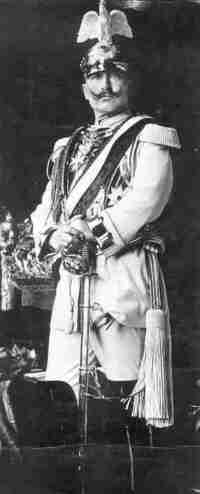 SKC Films Library |
| SKC Films Library >> Germany >> 1871-1918 |
| Wilhelm II German Emperor and King of Prussia, 1888-1918
Friedrich Wilhelm Viktor Albrecht was born in Berlin on January 27, 1859, the son of Crown Prince Frederick William of Prussia and Victoria, Princess Royal of Great Britain. The grandson of Queen Victoria of Great Britain, he was, through her, related in some way to most of the royalty in Europe. He was tutored by Georg Hinzpeter before attending the Friedrichsgymnasium at Kassel and then the University of Bonn. Kaiser Wilhelm II When Emperor Wilhelm I died on March 9, 1888, Friedrich's father inherited the throne, but he was already dying of throat cancer at the time and and died just 99 days later. Friedrich succeeded his father and was crowned Wilhem II, German Emperor and King of Prussia, on June 15, 1888. When Wilhelm ascended the throne, Germany's government was under the control of Chancellor, Prince Otto von Bismarck, who had exerted great influence over Emperor Wilhelm I and managed to gain almost complete authority over Germany. Wilhelm II frequently clashed with Bismarck over social issues, however, and he called for Bismarck's resignation in 1890. Rather than appoint a new chancellor, Wilhelm decided to rely on the advice of self-appointed ministers and run the government himself. Although he oversaw unprecedented growth in German industry and built up the army and navy until they were among the world's greatest, Wilhelm II proved inept in matters of foreign policy. His reliance on bad advice from his advisors led Germany into conflict with Britain, France, and Russia, and, ultimately, into a losing alliance with Austria-Hungary during World War I. In 1890, Wilhelm broke a long-standing Prussian alliance with Russia, but then tried to renew that alliance during that country's war with Japan (1894) in hopes of gaining a port in either China or Japan in return. The renewal of alliances never materialized, however, and Germany failed to gain an Oriental port. In 1905, Wilhelm's advisers convinced him to publicly support nationalists in Morocco in their fight for independence from France believing that doing so would give Germany a say in the partitioning of Africa. Unfortunately, Germany only managed to anger the French; not only did she fail to gain new African colonies, the Moroccans never even acknowledged Germany's support for their cause. Then, in the autumn of 1907, a British newspaper published an "interview" with Wilhelm in which he seemed to express a desire to interfere with British internal affairs. Although Wilhelm had no such intentions, he had already distanced Germany from Britain and the article simply widened that distance. On June 28, 1914, Archduke Franz Ferdinand of Austria, a friend of Wilhelm's, was assassinated in Sarajevo, Serbia. Wilhelm immediately offered to support Austria-Hungary in any action it deemed necessary to avenge the assassination, but he never imagined that war would be the result. In fact, Wilhelm actively tried to convince Austria not to take up arms against Serbia, but was unsuccessful. Then, when Russia joined forces with Serbia against Austria-Hungary, Wilhelm was obligated to honor his promise to Austria; and, since Russia already had alliances with Britain and France, Germany and Austria-Hungary soon found themelves allied against every other military power in Europe. As he had done with government affairs, Wilhelm relied on a series of advisers to manage Germany's war effort. Unfortunately, his military advisers were even less effective than his foreign affairs advisers had been, and by 1918 Germany was on the verge of defeat. On November 9, 1918, with German citizens in revolt and the German Navy in mutiny, Emperor Wilhelm II quietly slipped out of the country and went into exile in the Netherlands, which had remained neutral throughout the war. He spent the rest of his life as a country gentleman on an estate in Doorn, which he had purchased in 1919. He died there on June 3, 1941, and was interred in a mausoleum on the grounds. Marriages and Children Prince Friedrich Wilhelm married Princess Augusta Viktoria of Schleswig-Holstein on February 27, 1881. The couple had seven children:
Empress Viktoria died on April 11, 1921, barely a year after Prince Joachim had committed suicide. The following January, Wilhelm received a birthday greeting from a son of the late Prince Johann George Ludwig Ferdinand August Wilhelm of Schönaich-Carolath. The 63-year-old Wilhelm invited the boy and his mother, Princess Hermine Reuss of Greiz, to Doorn. Wilhelm found Hermine very attractive and greatly enjoyed her company. The couple were wed on November 9, 1922, and she remained a constant companion to the aging Emperor until his death. SEE ALSO |
| SKC Films Library >> Germany >> 1871-1918 This page was last updated on 06/15/2018. |
